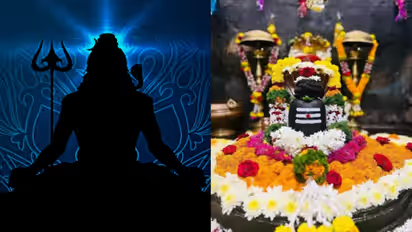When is Maha Shivratri 2024, March 8 or 9? Know date, puja timing, rituals and more

Synopsis
Maha Shivratri 2024: Here's all you need to know about the date, shubh muhurat, history, importance, and celebration of the Hindu festival of Mahashivratri. This year, the auspicious festival will be celebrated on March 8.
Shivaratri is celebrated in every month of the lunisolar calendar, by the Hindu calendar. Still, once a year, in late winter, Maha Shivratri is celebrated to commemorate the upcoming summer throughout India and among the Hindu population in Nepal and West Indies, with great pomp and show where the stories behind them often vary among different communities and regions. Maha Shivratri, literally translates as ‘the great night of Shiva’ and according to legend, it is on this predominantly Hindu festival night that Shiva performs his heavenly dance or ‘tandav’.
Date: This year, the auspicious festival will be celebrated on March 8.
Puja time: According to Drik panchang -
Chaturdashi Tithi Begins = 09:57 pm on March 08, 2024
Chaturdashi Tithi Ends = 06:17 pm on Mar 09, 2024
Nishita Kaal Puja Time = 12:07 am to 12:56 am, March 09
On March 09, Shivaratri Parana Time = 06:37 am to 03:29 am
History and significance:
According to Hindu mythology, there are various reasons why we celebrate Mahashivaratri. It is believed that Shiva and Parvati wedded on the day of Mahashivratri, hence the day is honoured annually to commemorate their wedding.
In other words, Shivratri is believed to be the night of Shiva and Shakti's merger, which represents the male and feminine forces that balance the planet. According to another tradition, Mahashivratri is celebrated to commemorate the day when Shiva swallowed the poison that was churned out of the ocean during Samudra Manthan, saving the world from darkness and dismay.
This poison accumulated in his neck, turning it blue, which is why Shiva is known as Neelkanth. Maha Shivratri is regarded the most promising of the 12 Shivratris performed each year, and in Hindu tradition, it is a serious holiday that commemorates 'overcoming darkness and ignorance in life'.
Throughout history, several tales have described the significance of Maha Shivratri, with one claiming that it is on this night that Shiva performs his cosmic dance of 'creation, preservation, and destruction'. Another tradition states that on this night, giving Shiva's symbols can help one conquer and let go of their sins, letting them to climb Mount Kailash and achieve'moksha'.
Maha Shivratri is not a pleasant Hindu holiday, but rather a time for self-reflection and introspection to promote growth and overcome obstacles to achievement. People around the country celebrate Maha Shivratri in accordance with local customs.
Some celebrate in the morning, while others conduct pujas and jagrans at night. Devotees also fast for the whole day on Maha Shivratri, eating only the next day after bathing. The fast is performed not just to get Shiva's blessings, but also to test one's own resolve.
Fasting during Mahashivratri is considered highly auspicious. Refraining from eating and drinking for a set period of time is also beneficial to both the body and the mind, and it is thought that praying to Shiva after fasting makes him pleased.
Milk, honey, fruits, and bel leaves are presented to the Shiva deity. Devotees begin the day with a dip in the Ganges, followed by a visit to the temple, where they fast and pray to Shiva. It is said that reciting Om Namah Shivaya bestows blessings and fulfils Shiva's wants and aspirations.
Explore the latest Lifestyle News covering fashion, wellness, travel, Food and Recipes, and more. Stay updated with trending Health News, fitness tips, and expert insights to inspire your daily living. Discover personalized lifestyle trends that keep you stylish and informed. Download the Asianet News Official App from the Android Play Store and iPhone App Store for everything that adds value to your everyday life.